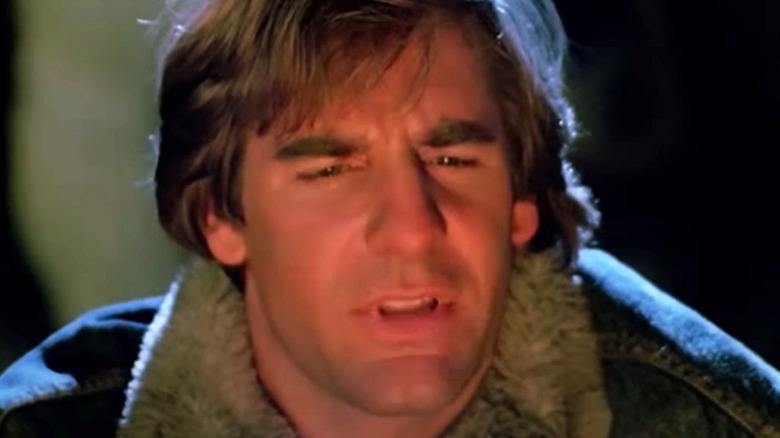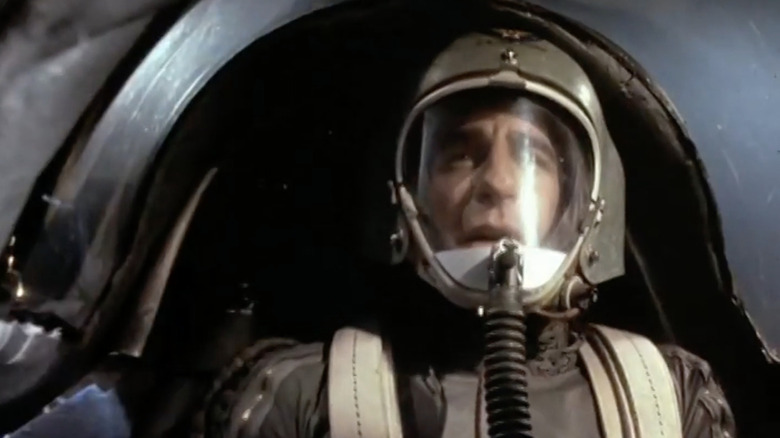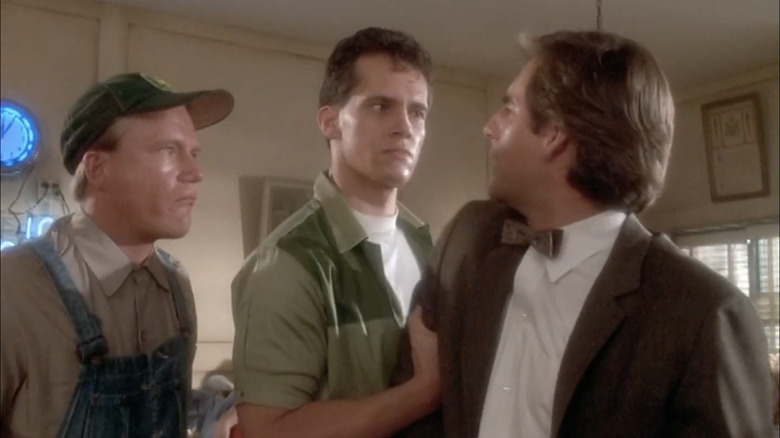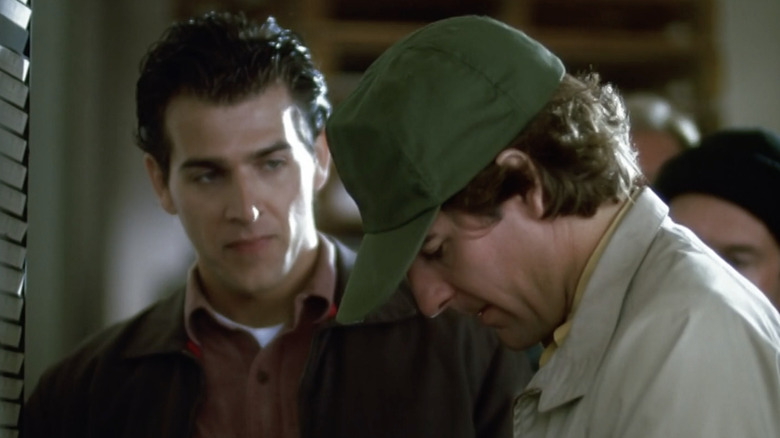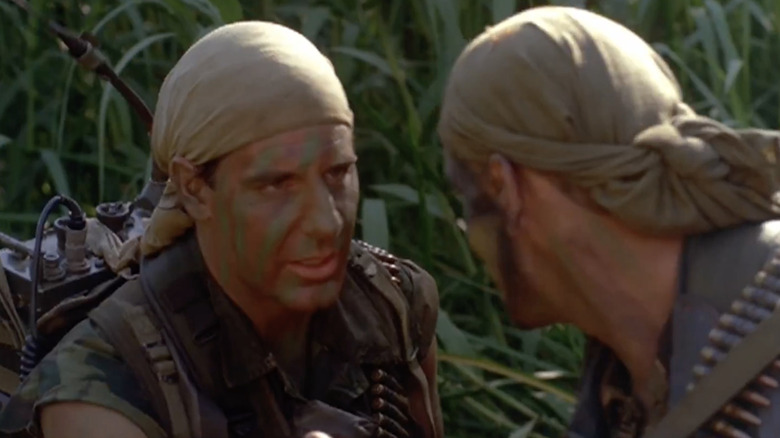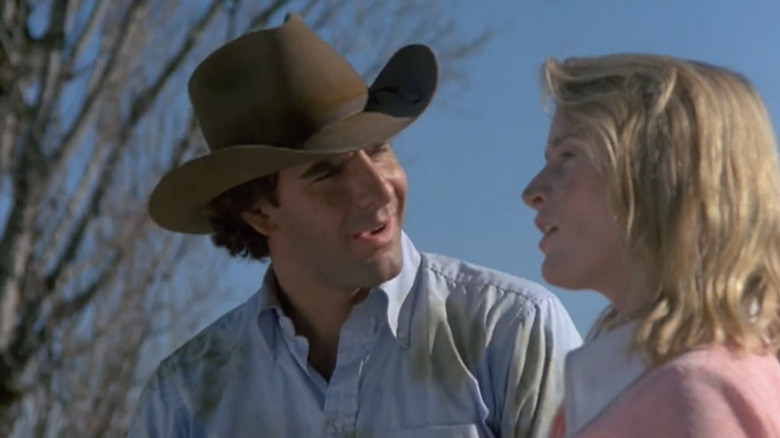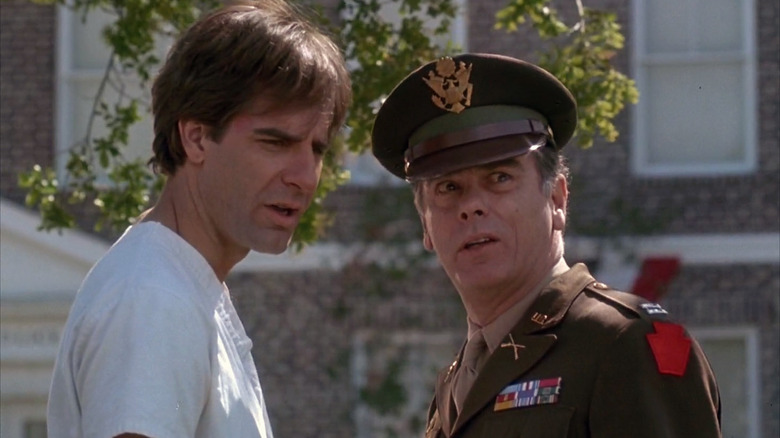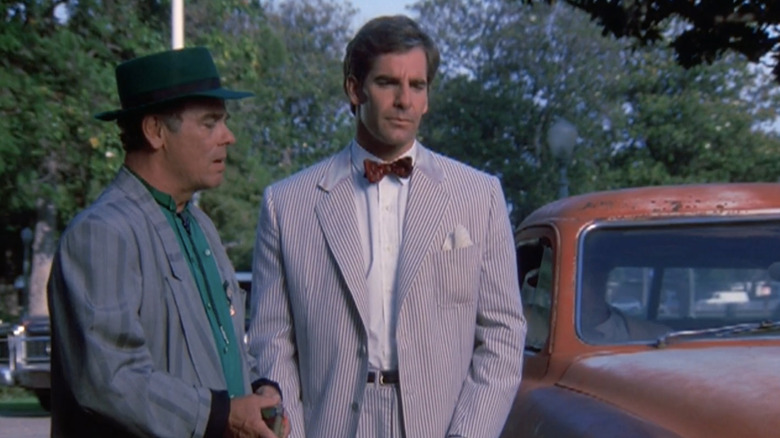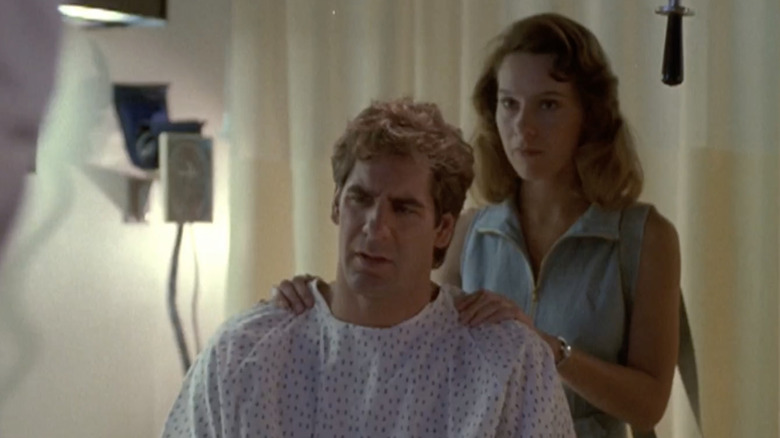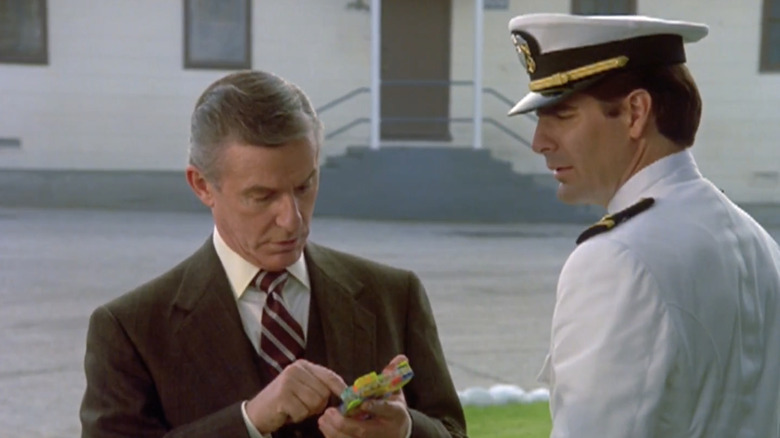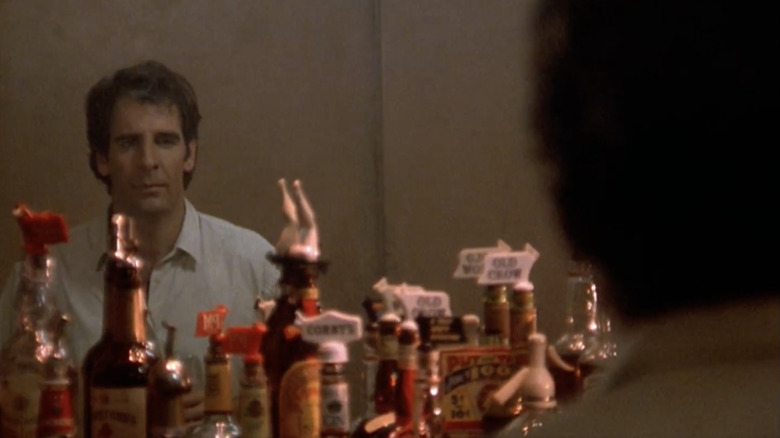The Best Quantum Leap Stories
"Quantum Leap" follows Dr. Sam Beckett (Scott Bakula), a time-traveling adventurer, as he attempts to correct the mistakes of the past. This unique premise allows the series to explore entirely different settings, casts, and dilemmas in each episode. Through it all, Sam Beckett acts as the series' anchor: No matter where or when he is, he remains humbly and heroically dedicated to his mission, whether that means facing down gangsters or rescuing lost children.
Though "Quantum Leap," which first hit the small screen in 1989, might seem a bit dated to modern eyes, it remains a uniquely entertaining work of sci-fi storytelling. Through five seasons and nearly 100 episodes, the show mixes melodrama with old-fashioned light-heartedness. Though you might expect this to result in something groan-inducing, in fact, "Quantum Leap" is resolutely charming. It was also one of its era's most intriguing shows, as viewers never knew what kind of story they'd be getting each week. Curious which installments of this beloved series are the absolute best? Look no further: These are the best stories from "Quantum Leap."
Genesis (Season 1, Episode 1)
The series opener finds Sam awakening in 1956, in the body of test pilot Tom Stratton. He has no memory of his life prior to the moment he entered the Quantum Leap imaging chamber. Soon, it becomes clear that Sam must successfully complete a test flight that originally killed Stratton. But how can a man with no memory — let alone piloting experience — succeed where a seasoned veteran failed? Thankfully, Sam's holographic assistant Al has piloting experience. He guides Sam through the flight and sends him leaping home ... or at least, he attempts to. In fact, Sam finds himself in 1968. By the end of this episode's second story, a feel-good baseball tale in which Sam must win a big game, Al realizes that getting Sam home won't be as simple as they hoped.
This two-hour episode is one of the finest TV pilots of the '80s. It successfully hooks the audience with two dramatic stories, sets up the show's clever premise, and establishes the high stakes at hand. If Sam can correct an injustice, he can eventually leap home. If he fails, he could be lost in time forever. Scott Bakula brings immediate pathos and relatability to the lead character, while Dean Stockwell somehow manages to make the smarmy, crass, bumbling Al Calavicci into a lovable sidekick. The pair's tremendous, show-shaping chemistry is instantaneous.
The Color of Truth (Season 1, Episode 6)
In this episode, Sam inhabits the body of Jesse Tyler, a Black chauffeur living in Alabama circa 1955. He must save the life of Jesse's elderly employer, Melny Trafford, widow of the former governor. Al, who witnessed the brutality of this period firsthand, warns Sam how dangerous it is to be Black in Alabama at this point in history. "The Color of Truth" soon becomes about more than simply saving Trafford's life, especially after Sam angers the townspeople by sitting at a whites-only lunch counter.
This episode doesn't present the most nuanced commentary on racism, and often portrays bigotry as being solely a thing of the past. Yet it still manages to make a much-needed statement about the viciousness of intolerance. In one particularly moving scene, Melny tells Sam that segregation is "just the way things are and the way things have always been." Sam replies, "Maybe it's times things changed." That's a message that is still needed today. This episode is also notable for featuring the first time Al is observed by a person in the past.
Jimmy (Season 2, Episode 8)
In this episode, Sam leaps into the body of Jimmy LaMotta, a young man with Down's syndrome eager to do well in his new job. This isn't simply a matter of ambition, however: Jimmy lives in 1968, when institutionalization was the norm for people like him. If he fails, he'll live out the rest of his days in a facility.
"Jimmy" is not an easy watch. In part, this is because it tackles a tough real-world issue, but mostly, it's because the show's portrayal of people with disabilities has become enormously dated. While Sam and Al's language and attitudes were perfectly reasonable for their era, they make for uncomfortable viewing in the modern day. Still, this episode stands out as one of the show's best, in large part because it presents Jimmy as a fleshed-out person with his own interests and struggles. "Jimmy" is definitely out of step, but its attempt to address a difficult subject head-on remains impressive, and largely successful.
M.I.A. (Season 2, Episode 22)
Arriving on April 1, 1969, Sam inhabits the body of Jake Rawlins, a Chicago detective, in this episode. Al tells Sam he's there to stop a married woman named Beth from meeting and falling in love with a man named Dirk Simon, who she'll meet during a chance encounter later that day. Beth's husband has been declared missing in action in Vietnam, but in truth, her husband has been taken prisoner. When he's released in 1973, he will return to find that Beth has moved on and married Dirk, leaving him heartbroken.
Al becomes noticeably obsessed with Sam completing this mission. He claims this is because he went through something similar when he served in Vietnam, but it's eventually revealed that Beth is, in fact, Al's ex-wife, and that Al himself is the husband who is missing in action. In addition to being a heartfelt story in which Al attempts to avoid the trauma of losing his wife to another man, it also sets up his time as a POW in Vietnam, which echoes through the rest of the series.
The Leap Home, Part 1 (Season 3, Episode 1)
In a mind-blowing twist, this episode sees Sam leap into himself at age 16. Back in the cornfields of Indiana, he has to help win a high school basketball game, which will set two schoolmates on the path to becoming doctors, and propel his teacher into becoming an NBA coach. But all Sam can think about is preventing his father from dying, stopping his brother from going to Vietnam where he will be killed, and keeping his little sister from marrying an abusive man. Eventually, he decides that he doesn't want to leap anymore, and plans to live out his days in his own past.
This episode is full of emotional moments, like when Sam's sister bursts into tears after he plays John Lennon's "Imagine" years before it will be written. Most impactful of all, however, is the moment Sam reveals himself as a leaper, in an attempt to convince his brother Tom not to go to Vietnam. Even though Sam does his best to warn him of the exact day he's slated to die, Al reveals that Tom is still killed on April 8, 1970. Sam is forced to confront the reality that he can save countless strangers, but not the people he loves.
The Leap Home, Part 2 (Season 3, Episode 2)
In the second part of "The Leap Home," Sam is Herbert "Magic" Williams, a member of Tom's platoon in Vietnam. The date is April 7, 1970 — the day before Tom Beckett will die. Sam is convinced he's there to save his brother's life. Why else, he reasons, would he be sent so close to him, in consecutive leaps? But Al's computer is uncertain. The odds are just as good that Sam is there to complete the platoon's rescue of a group of POWs. Before long, it becomes clear that completing this goal will mean letting Tom die.
Unfortunately, the computer doesn't have enough information on Tom's classified mission to help them know what goes wrong. In a clever move, Sam gets an embedded reporter, Maggie Dawson, invited to join their mission, in the hopes that she'll write a story that will appear in newspaper archives Al will be able to reference. But this trick gets Maggie killed, leaving Sam guilt-ridden. Given the uncertainty at hand, Al chooses to help Sam save his brother.
The episode's final twist is one of the show's most memorable. Maggie's posthumously published photos reveal that one of the POWs Tom would have rescued is Al. This means that Al helps Sam save his brother, at the cost of his own freedom.
A Hunting We Will Go (Season 3, Episode 18)
Sam leaps into Texas bounty hunter Gordon O'Reilly in this episode, which takes place in 1976. He finds himself handcuffed to the well-dressed Diane Frost, who happens to be a convicted felon he's transporting to jail. According to Al's data, Diane is going to kill Gordon and then be killed herself. Sam must get her into the sheriff's custody before they're both killed, all before the night is over. Though we're never quite sure if Diane is a real danger, she's clearly a troublemaker, as she gets Sam into hilariously dangerous mishaps with locals every chance she gets.
The real tension begins when Al insists she's innocent of her initial crime, though his computer and her behavior say otherwise. Slowly but surely, Sam begins to doubt she deserves her fate, and that he should hand her over to the authorities. Diane is a winningly sassy companion to the time-traveling pair, and sparks quick-witted banter between Al and Sam as they argue over her innocence or guilt. Their repeated setbacks on the way to the sheriff make this a delightfully adventurous romp.
The Leap Back (Season 4, Episode 1)
Role reversal episodes are a great way of forcing characters to face new challenges. In "The Leap Back," a lightning strike forces Al to become the leaper and Sam the holographic assistant. Al, who often gripes at Sam for how easy he thinks his missions must be, quickly finds out just how hard they truly are to accomplish. Simultaneously, Sam must guide Al without a computer to help him. At first, Sam happy to be back in the present ... until he discovers that the lightning strike has also trapped him in the holographic imaging chamber. After some clever time travel tricks (something this TV show truly perfected), he is released into his old life, earning a rare glimpse of the present day.
In this episode, fans get to spend time with Quantum Leap scientists like Gooshie, a project analyst with a brief appearance in the pilot, who are working feverishly to fix the problem at the center of the series. Sam also gets to talk with Ziggy, the snarky computer that runs Al's handlink computer. But most importantly, Sam finds himself back in his own life in this stirring installment. Having returned from being trapped in the past, he must confront the life he left behind — including the wife amnesia erased from his memory.
Justice (Season 4, Episode 4)
"Quantum Leap" is never afraid to take on serious issues. This is never more clear than in "Justice" a Season 4 effort that addresses racism in as dark a story as can be found in the series. Here, Sam leaps into Clyde, a Klu Klux Klansman. Somehow, he must find a way to save the life of Nathaniel Simpson, an embattled Black civil rights worker in Alabama circa 1965.
Episodes dealing with racism don't always work on "Quantum Leap," but this one definitely does. In part, this is because it subverts its usual formula by putting Sam in the shoes of the oppressor, rather than the oppressed. Set at the height of the civil rights movement, Black voter suppression is a central theme of the story. It becomes all the more troubling when Sam realizes that to save Simpson's life, he might have to support bigoted restrictions.
Throughout "Justice," Sam, along with the audience, experiences the era's shocking normalization of despicable racism. This forthright depiction of injustice is further elevated by the episode's excellent performances and high-wire-act tension (including an edge-of-your-seat climax). "Justice" truly earns its optimistic message, which tells us that no matter how long it takes, compassion will always trump hatred.
Raped (Season 4, Episode 6)
In this still-timely episode, Sam takes on the role of Katie McBain, a young woman of 1980 who has been sexually assaulted and beaten by high school athlete Kevin Wentworth. Sam must make sure he sees justice for his heinous crime, but unfortunately, Kevin is the town's golden boy. The community is unwilling to accept Katie's version of events, especially since Sam — as Katie — cannot testify to what happened, because he wasn't there.
The twists and turns of this story occasionally strain the bounds of credulity, but Sam and Al take Katie's story and situation seriously. Sadly, this is often not the case in television, or real life. While the ending feels a bit like a cop-out to avoid a completely dour (and, alas, more realistic) ending, "Raped" is nonetheless another "Quantum Leap" episode that successfully tackles an uncomfortable topic through a powerful premise. The seriousness and sensitivity with which it handles its subject matter remains notable, even today.
If you or anyone you know has been a victim of sexual assault, help is available. Visit the Rape, Abuse & Incest National Network website or contact RAINN's National Helpline at 1-800-656-HOPE (4673).
A Leap for Lisa (Season 4, Episode 22)
In "The Leap Back," Sam takes on the role of the holographic assistant. But in this acclaimed season finale, Sam literally takes his friend's place. Leaping into the Al Calavicci of 1957, Sam becomes a young Naval ensign facing a trial for the sexual assault and murder of his commander's wife — an attack the commander himself apparently witnessed a few nights prior.
Of course Sam-as-Al is innocent, but Commander Riker (no, not that Commander Riker) is dogged in his attempt to take Al down. Sam inadvertently alters his friend's fate when the woman who could corroborate his alibi is killed in a car accident before she gives testimony. As a guilty verdict becomes unavoidable, the holographic older Al ceases to exist, replaced by the inimitable Roddy McDowall of "Planet of the Apes" fame. This newly-appeared assistant insists that Al was never a part of the Quantum Leap program, and that Sam must be losing his memories again. In addition to righting a wrong, Sam must now also find a way to get Al back into existence.
A classic courtroom drama murder mystery, "A Leap For Lisa" showcases Bakula and Stockwell at the top of their game. What results is equal parts "A Few Good Men" and "The Butterfly Effect." McDowall puts the cherry on top of the "Quantum Leap" sundae, turning in a brief but memorable appearance as replacement hologram Edward St. John V.
Mirror Image (Season 5, Episode 22)
For five seasons, Sam Beckett is driven by an unknown force, leaping from life to life in an increasingly futile attempt to get home. Along the way, he saves people from untimely deaths, alters fate, and makes right what once went wrong. The series finale, Season 5's "Mirror Image," caps off its magical run with a brilliant mixture of the ambiguous and the definitive, cementing the show as required viewing for any fan of sci-fi TV.
There is no mission to complete in "Mirror Image." Instead, Sam finds himself in a bar that feels foreign, but also strangely familiar. Shockingly, when he looks in the mirror, he sees himself — he hasn't leaped into a stranger. While this sci-fi drama is often filled with wacky technobabble and genre-specific twists, "Mirror Image" instead dips into the well of philosophy and metaphysics, exploring ideas more familiar to scholars and saints than family TV writers. Ultimately, it leaves audiences without the big-red-bow conclusion many expected: Sam never leaps home to resume his life. But the audience knows that he has chosen to continue leaping. This episode pulls together pathos, joy, and mystery in such a wholly unexpected and rewarding manner that viewers have been discussing it ever since it aired.
